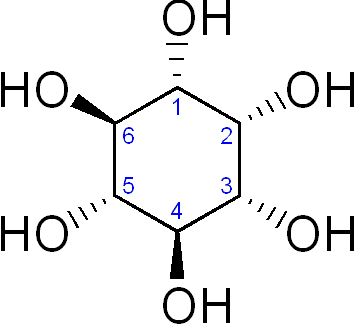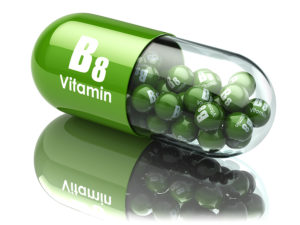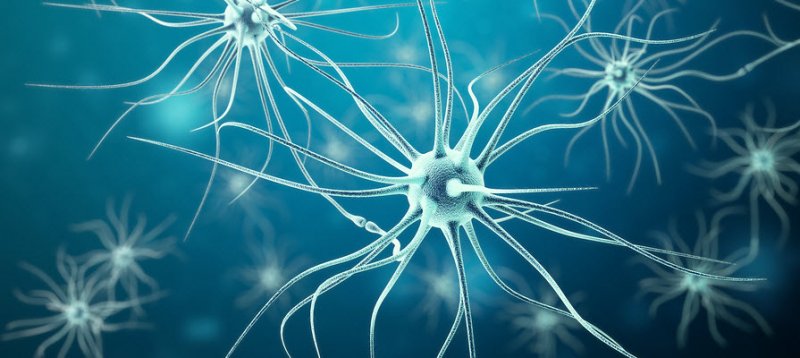Table of Contents
Vitamin B8 (Inositol) is a sugar alcohol and isomer of glucose. As a nootropic, inositol is involved in brain cell signaling, and is a component of cell membranes.
Vitamin B8 is no longer considered a ‘true’ B-Vitamin because your body can make inositol on its own. A “true vitamin” is either essential for life and/or cannot be made by the human body. So inositol no longer qualifies.
Inositol is used in your brain as a “secondary messenger”. It facilitates communication between brain cells. All of your major neurotransmitters need inositol to relay messages.
Inositol is also a component making up the phospholipid ‘shell’ encasing each brain cell. Once again, inositol acts as a messenger of sorts by assisting in the transport of amino acids, proteins and neurotransmitters across and into the brain cell.
Inositol is a ‘group’ of 9 molecules called ‘stereoisomers’. Myo-inositol is the most abundant stereoisomer, making up 90-95% of the total free inositol in your body.
As a nootropic, Vitamin B8 (Inositol) can be used to treat panic attacks and anxiety, depression, Obsessive Compulsive Disorder (OCD), bulimia, depression in bipolar disorder and mood swings.
Vitamin B8 (Inositol) helps:
- Brain Optimization: Inositol helps boost serotonin and dopamine receptor density. Improving the effectiveness of serotonin, GABA, glutamate and dopamine neurotransmitters in your brain.
- Neurotransmitters: Inositol improves the effectiveness of major neurotransmitters in your brain. Boosting alertness, concentration, focus, motivation and memory.
- Mood: Inositol is often used along with popular antidepressant medications improving their effectiveness. Or sometimes even replacing SSRI’s in the treatment of depression, anxiety, panic attacks and OCD.
What is Inositol?
Vitamin B8 (Inositol, cyclohexanehexol) is a sugar alcohol and isomer of glucose found in nearly all animals and plants.
Inositol is a group of 9 molecules called stereoisomers. In this article we’re talking primarily about myo-inositol which accounts for up to 95% of the inositol in your body.

Vitamin B8 is no longer considered a ‘true’ vitamin because our body makes inositol. And we can get it from most types of food.
Myo-inositol is involved in cell-signaling. In the simplest terms, myo-inositol hears from the first neuron that it’s about to fire over a neurotransmitter. And passes that information on to the receiving neuron. Not enough inositol and the neurotransmitter can’t do its job.
Inositol is one busy molecule in your body:
- Myo-inositol affects mRNA which regulates cell volume.[i]
- Phosphatidylinositol signaling pathways control signals inside and outside of brain cells.[ii]
- Inositol plays a role in DNA repair[iii]
- Inositol affects long-term potentiation[iv]
- Myo-inositol is a component of cell membranes
- Myo-inositol regulates cell metabolism
- Myo-inositol regulates cell energy consumption
How does Vitamin B8 (Inositol) work in the Brain?
Vitamin B8 (Inositol) boosts brain health and function in several ways. But two in particular stand out.
- Inositol influences neuroplasticity and neurotransmitters. Transcranial Direct Current Stimulation (tDCS) has been used to treat depression, Parkinson’s Disease, stroke and pain. But the maximum effect of tDCS in the brain was not until several minutes after treatment. Which indicates the effects of tDCS is not by direct neurotransmitter action like you would expect for example if you were using a nootropic.[v]
Researchers concluded the effect of tDCS was best explained by the activation of a ‘secondary messenger system’, and modulation of brain cell membrane proteins.
Neurotransmitters, neuromodulators and hormones have been shown to exert their action via an intracellular (inside the cell) secondary messenger system in which the activated neuroreceptor stimulates the turnover of inositol phospholipids.[vi]
Clinical studies have found that low levels of inositol are present in patients with anorexia, brain disorders and depression.[vii] And abnormal levels of myo-inositol in middle-aged adults can signal the initial stages of cognitive decline such as Alzheimer’s and dementia.[viii]
- Inositol helps reduce anxiety and depression. Long-term potentiation needed for encoding long-term memories, and long-term depression, rely on neural signal transmission and synaptic plasticity. And both are strongly influenced by the myo-inositol and phosphoinositide pathway.[ix]
A meta-analysis and systematic review of clinical studies were evaluated comparing inositol for depression and anxiety disorders. The researchers concluded that inositol was beneficial for treating depression and anxiety.[x]
How things go bad
Inositol is an important component of brain cell membranes. And is critical as a secondary messenger for both intra- and extra-cellular signaling.
 Low inositol levels have been found in those with major depressive disorder, Alzheimer’s, Parkinson’s and other neurodegenerative diseases. Science does not yet know if low inositol is a result of, or contributes to these diseases.
Low inositol levels have been found in those with major depressive disorder, Alzheimer’s, Parkinson’s and other neurodegenerative diseases. Science does not yet know if low inositol is a result of, or contributes to these diseases.
↓ Inositol levels decline
↓ Serotonin and dopamine receptor density declines
↓ Anxiety and depression get worse
↓ Concentration, cognition and memory decline
↑ LDL-cholesterol (bad) and triglycerides increase
↓ HDL-cholesterol (good) levels decline
↑ Inflammation and oxidative stress damage neurons
Vitamin B8 supplementation can help increase the density of serotonin and dopamine receptors in your brain. And improve neurotransmitter signaling. Helping you to cope with stress, lessen depression and improve memory.
Vitamin B8 (Inositol) Benefits
Myo-inositol enhances serotonin neuroreceptor sensitivity.[xi] And several studies have proposed a SSRI-like role for myo-inositol. Researchers believe inositol works as a SSRI because it is a secondary messenger of serotonin.
In other words, inositol gets a message from the 1st neuron that says it wants to send over a serotonin molecule. Inositol picks up that message and lets the receiving neuroreceptor know there’s an incoming serotonin molecule. Serotonin signaling is fixed and depression goes away.[xii]
In some regions of your brain, serotonin acts more like a “neuromodulator” rather than a “classic” neurotransmitter. And can affect glutamate and GABA as well.[xiii]
As a secondary messenger, inositol is an integral part of neuroplasticity and neurotransmitter signaling. Affecting anxiety, alertness, concentration, cognition, depression and all forms of memory.
A large percentage of patients do not respond to SSRI’s when used to treat depression or anxiety. The problem could be depression not related to serotonin or GABA deficiency (they could have a dopamine problem instead).
But if it is serotonin-related depression and there is no response to SSRI’s, inositol may help. Myo-inositol helps relay the messages sent and received by serotonin receptors.
Another problem with SSRI’s like lithium is Serotonin Syndrome. Too much serotonin can be released in the brain which can be toxic and deadly. Or the SSRI can deplete stores of inositol which raises serotonin levels too high.
Once again, inositol comes to the rescue. Researchers found that myo-inositol + lithium alleviated Serotonin Syndrome.[xiv]
Myo-inositol regulates blood sodium levels which helps in the maintenance of healthy myelin sheaths that protect neurons.
Myo-inositol protects your brain from a leaky blood-brain barrier that if left unchecked, would allow toxins produced in your liver to enter your brain.[xv]
Inositol can relieve anxiety and Obsessive-Compulsive Disorder (OCD). Myo-inositol can reduce panic attacks. And inositol can reduce mood swings.
Studies show that inositol is as effective as SSRI’s in treating the symptoms of bulimia and binge eating.[xvi]
Inositol can protect against lung cancer caused by smoking.[xvii]
Myo-inositol increases sperm concentration, total sperm count, and re-balanced follicle stimulating hormone and luteinizing hormone in infertile males.[xviii]
Myo-inositol can help lower LDL-cholesterol (bad-cholesterol), C-reactive protein and blood glucose levels while increasing HDL-cholesterol (good cholesterol).[xix]
Inositol reduces inflammation. Phosphatidylinositol reduces pro-inflammatory cytokines.[xx] And D-chiro-inositol decreases the mRNA expression and secretion of tumor necrosis factor-α, interleukin 6 (IL-6).[xxi]
D-chiro-inositol has anti-aging properties and can extend lifespan.[xxii]
The bottom-line is inositol is a potent pseudo-vitamin and can be a great compliment to any nootropic stack.
How does Vitamin B8 (Inositol) feel?
Inositol makes it easier to fall asleep. Unlike other sleep-inducing nootropics or sleep meds, it doesn’t “knock you out”. Falling asleep is just effortless.
Inositol increases serotonin and dopamine receptor densities. So damage that you may have done to dopamine receptors are repaired (particularly an issue with ADHD stimulant meds). And serotonin is simply more effective. Anxiety decreases, motivation goes up and depression goes away.
Inositol is great for social occasions because social anxiety levels decrease. In fact, inositol outperformed fluoxetine (Prozac®) at reducing panic attacks and can become effective in just a few days. With no side effects.
Some neurohackers feel that supplementing with inositol is the best anti-depressant they’ve every used. The real beauty of inositol is you can safely combine it with the current antidepressant (i.e. SSRI) medication you currently take. Your antidepressant meds may work better!
Inositol is a proven remedy for treating the symptoms of Obsessive-Compulsive Disorder (OCD). You should feel a noticeable reduction in negative thoughts. Some things just won’t bother you as much. And won’t dominate your thoughts so easily.
And inositol is an effective method of taming panic attacks.
Vitamin B8 (Inositol) Clinical Research
Inositol to Treat Panic Attacks
Estimates are that only about 70% of patients respond to standard drug treatments for panic disorder. And many often discontinue the drugs because of negative side effects.
Israeli researchers decided to compare inositol with the SSRI fluvoxamine (Luvox®) for panic disorder. In this double-blind, controlled, random-order crossover study 20 patients completed 1 month of 18 grams per day of inositol and 1 month of 150 mg per day of fluvoxamine.
In the first month, inositol reduced the number of panic attacks per week by 4 compared to only 2.4 for fluvoxamine. Nausea and fatigue were noted with those using Luvox® but not with inositol.
The natural compound inositol was more effective than a SSRI for treating panic disorder.[xxiii]
Vitamin B8 (Inositol) for Depression
A study published in the American Journal of Psychiatry noted that levels of inositol in depressed patients were lower than normal. In this trial, the authors administered 12 grams per day of inositol or a placebo to depressed patients for 4 weeks.
The overall improvement in depression scores was significantly greater than placebo by week 4. And no side effects were noted.
The researchers commented that “this is the first time a precursor strategy for a secondary messenger rather a neurotransmitter” was used in treating depression.
The authors concluded that “inositol had a significant antidepressant effect”.[xxiv]
Another study tried using inositol to treat Premenstrual Dysphoric Disorder (PMDD). PMDD is a particularly nasty form of PMS. It’s a condition in which a woman has severe depression, irritability and tension before menstruation.
Scientists don’t really know what causes PMDD except it has something to do with serotonin. Serotonin is the “calming neurotransmitter”. When it fails for any reason you get depressed, irritable, obsessive, negative and worried.
In this 2-phase clinical trial, PMDD patients were given myo-inositol in powder form, or a soft-gel capsule equivalent to 2 grams of myo-inositol.
The results showed a significant improvement on 3 different scales of measuring depression. Inositol significantly improved PMDD and associated depression, irritability and tension.[xxv]
Vitamin B8 (Inositol) for OCD
Inositol is good for treating Obsessive-Compulsive Disorder (OCD). OCD is a type of anxiety characterized by unwanted, recurring thoughts and behaviors.
One double-blind, controlled crossover trial treated 13 OCD patients with 18 grams per day of inositol for 6 weeks.
The OCD patients had significantly lower scores on the Yale-Brown Obsessive Compulsive Scale when taking inositol than when taking placebo.
The authors concluded that “inositol is effective in depression, panic, and obsessive-compulsive disorder, a spectrum of disorders responsive to selective serotonin reuptake inhibitors (SSRI’s)”.[xxvi]
Vitamin B8 (Inositol) Recommended Dosage
Recommended dosage for inositol is up to 3 grams per day. Typically split into 3-doses of 1 gram each. One in the morning, one at noon, and your final dose before bedtime.
Clinically effective dosage for depression and anxiety is up to 12 grams per day. Split your dose into 3-times per day. 4 grams in the morning, 4 grams at noon and 4 grams prior to bedtime.
Clinically effective dosage for OCD is up to 18 grams per day. Split into 3 equal doses of 6 grams each.
The clinical dosages mentioned here are the ones used in clinical trials. Most people experienced relief of symptoms within 3 months. Some people showed improvements within a week or sooner.
Important note: It may not be necessary for you to go as high as 12 or 18 grams per day. Inositol could be just as effective for you in much smaller doses.
Most neurohackers notice benefits when taking 3 – 4 grams per day or less.
Vitamin B8 (Inositol) Side Effects
Vitamin B8 (Inositol) is non-toxic. So is considered well-tolerated and safe.
Higher doses like those used in clinical trials could result in flatulence, stomach upset, nausea, diarrhea, increased mood swings for bipolar or psychosis patients.
If you’ve been diagnosed with bipolar or bipolar-spectrum disorder, please consult a pharmacist or your doctor before using inositol.
Studies have shown and neurohackers verify that inositol supplementation may reduce testosterone levels and libido. Most of the Low-T reports were by woman but I’ve heard a few men reporting Low-T and libido from inositol as well.
Types of Vitamin B8 (Inositol) to Buy
Inositol is available in capsules, softgels, and in powder form.
Inositol powder is the least expensive way to supplement with this nootropic. Inositol is basically a sugar so it tastes sweet. Not as sweet as sugar but it tastes good on its own. Or mixed in your favorite beverage.
Lecithin is comprised of both inositol and choline. So lecithin as a supplement will provide you with inositol.
Inositol is often supplied by supplement manufacturers as “inositol + choline”. The thinking behind this combined supplement is that inositol compliments the effects of choline.
When inositol and choline are used together, they are supposed to improve nerve function and help you metabolize cholesterol.
The combination of Myo-Inositol & D-Chiro Inositol is often marketed to women who are dealing with Polycystic ovary syndrome (PCOS).
But high doses of choline can leave you depressed and sleepy. So if you want to add inositol to your nootropic stack, I suggest you avoid the combination and go with straight inositol.
Some multivitamins also include some form of Vitamin B8 (Inositol) in their formula. But many of these multis don’t contain enough for optimum health. And many have an isolated or synthetic version of this nutrient.
The Click for Performance Lab® Multi offers a nature-identical form of Vitamin B8 (Inositol) and is now my favorite daily multivitamin/mineral supplement.
I prefer the Performance Lab® multi because it’s more potent, it’s biologically active and I’ve found to be a far more effective multi compared to every other multivitamin supplement I’ve ever used.
Performance Lab® uses their own priority NutriGenesis® vitamins and minerals which are grown on probiotic, plant and yeast cultures in a state-of-the-art lab.
Nootropics Expert Recommendation
Vitamin B8 (Inositol) up to 3 grams per day
 I recommend using Vitamin B8 (Inositol) as a nootropic supplement.
I recommend using Vitamin B8 (Inositol) as a nootropic supplement.
Your body does make Vitamin B8 on its own. And you get it from food. So it is unlikely that you are inositol deficient. But if you want to try inositol for its anti-anxiety and antidepressant benefits, you must take it as a supplement.
Inositol is especially helpful for those suffering from anxiety, depression, panic attacks, or OCD.
Experience shows Inositol helps stop and reverse the symptoms associated with high cholesterol levels. B8 will lower ‘bad’ LDL-cholesterol as well as raise ‘good” HDL-cholesterol.
Vitamin B8 is also particularly helpful to quell anxiety caused by social situations.
Vitamin B8 can help you get a good night’s sleep. Many find it more effective than sleep meds and other nootropics used for sleep. You’ll awaken feeling refreshed and calm. Ready to start your day.
The recommended dosage of Vitamin B8 (Inositol) is up to 3 grams per day. But start at a gram or less, and work your way up depending on how you feel. Clinical doses of 12 or 18 gram are usually not needed for most people.
At the very minimum every neurohacker should be using a multivitamin every day that includes Vitamin B8 (Inositol). The best multi I’ve found and use every day is the Click for Performance Lab® Multi for men or women.










Join The Discussion - 213 comments
Ana
July 7, 2020
Hi David,
Thanks for the post. I’ve been reading a lot about inositol lately and everything makes sense in terms of its brain effects. The only thing I’m having problems to understand is how supplements affect the brain since inositol doesn’t cross the blood brain barrier (I could be wrong on that). I was wondering if you knew anything about this.
Thanks,
Ana
David Tomen
July 8, 2020
Ana, who told you that inositol can’t cross the blood-brain barrier? I have a couple dozen clinical studies linked throughout this review showing how inositol benefit brain health. The most effective form for cognitive health is Myo-Inositol.
TC
October 19, 2024
Hey Dave,
I came across that blood brain barrier problem too in the article below. Under section 1.2 and the end of the 2nd paragraph.
https://pmc.ncbi.nlm.nih.gov/articles/PMC9955821/
David Tomen
October 20, 2024
I am not sure what the author is talking about but he does point to this study: https://pubmed.ncbi.nlm.nih.gov/3173626/
Pavithra
May 16, 2020
Hi David,
I have been suffering from severe OCD and I am currently in a very debilitating condition where I am just stuck to my room and avoid going elsewhere.
I just wanted to know which is the safe brand of inositol powder available in India? By safe I mean that has no added preservatives and other alternative content. I am very paranoid about this. Also, is there any other good supplement to add with this for OCD alongside iron deficiency.
Any lead is much appreciated.
David Tomen
May 16, 2020
Pavithra, I’m not familiar with the dietary supplement market in India. So cannot provide a recommended vendor or brand. Hopefully, someone else from India comes across this comment and will be able to help you.
But I did write a piece on 7 Tips for Choosing the Highest Quality Nootropic Supplements which you will find here: https://nootropicsexpert.com/7-tips-for-choosing-the-highest-quality-nootropic-supplements/. I hope those tips can help you better read a label so you can wisely choose the best Inositol supplement in India.
Amy Wiggans
June 5, 2020
I take inositol from a company called True Hope. They specialize in supplements for mental health, and you could order from their website. I also take a multi-vitamin called EMP which is amazing. It has 36 vitamins and minerals for optimum brain health. My mom takes inositol for her OCD and anxiety, and finds it helps a lot. I give it to my kids if they are having trouble falling asleep, sometimes worrying or scared. All the best!
Chris
April 25, 2020
Hi David,
Are there are any safety concerns regarding usage of 1 mg myo inositol long term? Should I make pause between bottles or I can take it every day at such doses without a problem?
I have a mild side effects like it makes me a bit less concentrated and small headache sometimes, but it calms my anxiety a lot, so I don’t want to switch it.
I am taking it for 2 months.
David Tomen
April 25, 2020
Chris, the recommended dosage for myo-inositol is up to 3 grams per day. 2,000 mg per day is more common. Not sure you’ll get much benefit from 1 mg of myo-inositol. But if that is what you mean I don’t see any harm in using it daily forever.
Chris
April 26, 2020
I see. Usually I benefit from most of the nootropics on a lower than recommended dosage, not sure why.
Thanks for the answer.
Kelly
March 29, 2020
Hi again David,
This may have been the article I was looking for! I remember trying this supplement before. I have been having tons of paralyzing anxiety/OCD/panic. My Dr started me on 5mg buspirone 3x/day. Although it took the edge off a bit, it is giving me extremely dry mouth and insomnia. After telling my Dr, she said she would like to take away my nighttime dose and substitute it with Hydroxyzine (kept me up all night and gave me the shakes the next day), Gabapentin (worked for a night, but don’t want to take it consistently), or Lunesta (makes me a bit nervous with sleep walking/driving reports). She also wants me to start taking Zoloft. This is why I’m not a huge fan of antidepressants. You end up taking a bunch of meds in the end. THen there’s the terrifying seratonin syndrome, which from what I’ve read buspirone and zoloft together raise the risk of! From what this article says, seratonin syndrome should not be a concern with this at all, correct?
Also, do you know if there are other supplements/meds to be avoided while taking this? Then only meds I’m on aside of this new mix is Levoxyl and Prometrium.
David Tomen
March 30, 2020
Kelly, my research showed that you can use myo-inositol with antidepressants without a problem and they may even work better. In fact, one researcher found that you can counter serotonin syndrome by combining myo-inositol with lithium orotate.
Best place I’ve found for drug interactions, which I suggest you bookmark, was started by a couple of New Zealand pharmacists which you’ll find here: https://www.drugs.com/drug_interactions.html
Kelly
March 30, 2020
Thank you for your response! I have ip6 gold (not sure if you are at all familiar with that brand) that I ordered around 2-3 years ago, but amazingly doesn’t expire until next month. I will give it a try. I do use drugs.com often, but sometimes it doesn’t show all interactions with supplements.
Dave
March 22, 2020
Hello David,
Thanks for the information you shared on the website. It’s really useful.
I’ve been using Inositol 500 mg/1g for nearly a month and it’s seems to be really good for my anxiety/OCD.
The problem with it is that if I take it alone, my mood goes very low/dull/depressive.
If I stack it with NAC (500 mg, 1 time per day) and/or 5-HTP (25 mg, 1 time per day), it’s a bit better.
Do you think that this might be related to the concrete brand/type of Inositol?
I am using Nature’s Way Inositol (which is advertised as a Crystalline Inositol). I saw many suggestion about Jarrow Formulas Inositol recently, so I am not sure whether it’s suitable to switch it.
David Tomen
March 22, 2020
Dave, never heard of “Crystalline inositol”. There are different versions of inositol and myo-Inositol is typically used for nootropic benefit. The side effects you mention usually only happen with very high doses of this nootropic. No idea why a small dose of 5-HTP would make a difference.
Sometimes it’s difficult to figure out what ‘type’ of inositol is in a bottle. Jarrow for example has a version that states in big letters on the front label “Inositol”. But when you dig around for more information you find out it’s myo-Inositol.
There are a few studies and some user reports that inositol reduces testosterone levels. Maybe that’s what’s happening with you. But I think this is worth exploring because of clear evidence showing clear benefits for symptoms of OCD.
Dave
March 23, 2020
David, Thanks for the information.
It might be testosterone, as after an intensive walk the mood is slightly boosted.
I’ve tested my testosterone levels before taking inositol and they were fine.
Do you think that these doses 500 mg/1 mg can cause a fertility problems in men?
Also, do you have any suggestions about an Inositol brand?
Thanks again.
David Tomen
March 23, 2020
Dave, inositol “re-balanced” follicle stimulating hormone and luteinizing hormone in infertile males under 45 yrs. old. In this case it increase sperm count. But the word “re-balanced” is a little suspicious I think. To me it just means it affects male hormones. And results may vary between guys. But only some men report a loss of libido when using inositol. I didn’t and use this one: https://amzn.to/2WJD6lH
Dave
March 24, 2020
Thanks, David! I will check it.
Svetoslav
April 8, 2020
Hi David,
I am replying to this comment as it’s reference to your suspicion regarding testosterone levels drop.
I’ve tested mine and compared to a month ago, when my levels were 22 nmol/l before Inositol, they’ve dropped to 18.4 nmol/l.
Reference values – min 7.58 nmol/l – max 31.4 nmol/l.
Not sure whether that’s a much of a drop after a more than month of usage. Dosage pretty much vary between 750 mg – 1000 mg per day.
I’ve also tried Choline as an addition to see whether that dull/low/depressive/foggy mood will disappear, but Choline gaves me more anxiety after two doses of 150 mg.
It seems that it’s not brand related as I switched from Natures Way to Jarrow formulas and it’s pretty much the same.
Do you think that it’s worth to add an additional testosterone boost supplement to Inositol or I should look for the reason behind this strange ‘effect’ elsewhere?
David Tomen
April 23, 2020
Svetoslav, I would just avoid Inositol altogether because it sounds like you are one of the people who react negatively to it. Do you know what your total testosterone levels are?
nootronaut
January 14, 2020
Hi, David.
First of all, thank you for this website and the time you’ve taken to share your knowledge with the world. You’ve changed many peoples’ lives for the better.
I want to know if you can give me a bit of feedback on the things I’ve been taking. I suffer from depression, anxiety, insomnia, chronic pain, stress…you name it. Brain fog. OCD. Fatigue. Difficulty concentrating and memory issues. Disorientation. (I know, it sounds like I’m a hypochondriac).
I was prescribed SSRI’s, adderall, and gabapentin, but opted not to take them because I don’t want to go develop a life-long dependency on that heavy stuff. I’m 32 years old.
I’m taking the following:
Rhodiola (1x a day, capsule, 300mg)
B1 sulbutiamine (2x a day, capsule, 600mg)
L-Theanine (2x a day, capsule, 400mg)
Gingseng (2x a day, capsule, 1000mg)
Turmeric Curcumin (3x a day, capsule, 1500mg)
Magnesium L Threonate (2x a day, capsule, 2000mg)
Pine Bark (3x a day, capsule, 1500mg)
Milk Thistle Seed Extract (1x a day, capsule, 175mg)
Maca (2g a day, powder)
Inositol B8 (2g a day, powder, 3x a day)
Bacopa Monnieri (powder, 1x a day)
Lion’s Mane (500mg, powder, 3x a day)
Ginko Biloba (250mg, powder, 3x a day)
I started on Kava but stopped because I am afraid it might be too much for my liver.
Any thoughts are appreciated.
David Tomen
January 16, 2020
Bernard, it looks like you are on the right track. But it really depends on the cause of each of your symptoms. Which is not easy to determine unless you do some experimenting.
For example, I explain the process of trial and error in the post on nootropics for social anxiety. And using the process of elimination by going through each of the neurotransmitter precursors to see if any of them are the issue: https://nootropicsexpert.com/best-nootropics-for-social-anxiety/
On the other hand, in my writing on depression I suggest a different approach. And that is address each of the issues that could cause depression. Including neurogenesis, neurotransmitters, other meds, or stress: https://nootropicsexpert.com/best-nootropics-for-depression/
I suggest choosing one approach or method and work through it step by step. And see if you can get to the bottom of what is causing your symptoms.
Right now you’re using a ‘shotgun’ approach and hoping for the best. Unless I a missing your strategy here …
Meghan
January 13, 2020
I have heard from a dietician that taking Inositol in conjunction with Vitamin D can help with depression/depressed moods, is there evidence of this being a power-duo?
David Tomen
January 13, 2020
Meghan, I’m not currently aware of a specific study using this combo. But it makes sense because there is plenty of evidence that each of these helps alleviate the symptoms of depression.
Dawn Peach
November 15, 2019
Hello David, I have found this all very interesting to read. I have suffered with anxiety and depression for many years on and off. I took Celexa for about 5 years and unfortunately stopped that cold turkey as I felt it wasn’t doing me any good any more, although it had. I had also hit post-menopause and I sank into a terrible black pit but was suffering some other major stresses in my life. I could’nt sleep, was tired but wired, anxious, depressed, felt like i was dying. I was prescribed Effexor XR and Benzos (to hep with sleep for a little while) in 2010. I was defficient in Zinc, and tests at Naturopath revealed Adrenal Fatigue, plus multi nodule thyroid goitre (though thyroid test always within range). Took Effexor for a couple of years then came off but symptoms returned. Have been back on for 4 years and am now on the lowest dose. Can I try Inositol with low dose Effexor? Many thanks.
David Tomen
November 15, 2019
Dawn, I feel sorry for what you’ve put your poor brain through by quitting these things cold turkey. Then trying something else. Ouch!
Effexor is classified as a serotonin-norepinephrine reuptake inhibitor (SNRI). And Inositol can help increase the density of serotonin and dopamine receptors in your brain. So it may support the way Effexor works and may possibly even make it work better than the drug on its own.